Sri Lanka ready to join BRI phase two, China FTA to be expedited
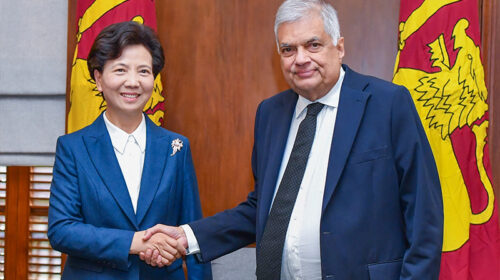 ECONOMYNEXT – Sri Lanka is among countries ready to join the second phase of China’s Belt & Road Initiative (BRI), with a free trade agreement (FTA) between the two countries to be also expedited, according to a discussion between President Ranil Wickremesinghe and a top Chinese official.
ECONOMYNEXT – Sri Lanka is among countries ready to join the second phase of China’s Belt & Road Initiative (BRI), with a free trade agreement (FTA) between the two countries to be also expedited, according to a discussion between President Ranil Wickremesinghe and a top Chinese official.
Wickremesinghe told visiting special envoy of the Chinese President, state councillor Shen Yiqin, that the BRI is expected to make a more substantial economic contribution, according to a statement from the president’s office said Monday November 20 afternoon.
China is also prioritising the extension of a China-Myanmar Economic Corridor to the island nation, according to Yiqin.
This was during a courtesy call paid by President Xi Jinping’s envoy to President Wickremesinghe Monday morning in Colombo. Both parties also agreed to expedite the implementation of the China-Sri Lanka Free Trade Agreement, the statement said.
The primary focus of the meeting was to enhance tourism and trade relations between the two countries, according to the statement.
“The President expressed gratitude for China’s support to Sri Lanka, notably acknowledging their assistance in the country’s debt restructuring programme. He extended sincere thanks to the Chinese President and the government for their invaluable support in this regard,” the statement said.
Wickremesinghe also expressed Sri Lanka’s desire to augment cooperation between the two countries in the fields of tourism, sports and agriculture . Both the Hambantota Port and Colombo Port City are currently prepared for investment opportunities, he said.
“The President also noted that countries such as Sri Lanka, participants in the Belt & Road initiative, are prepared to embark on the second phase of the initiative, which is expected to make a more substantial economic contribution.
“The President outlined the measures taken by Sri Lanka to access the Regional Comprehensive Economic Partnership (RCEP), and further affirmed Sri Lanka’s commitment to preserving the Indian Ocean as a free zone for navigation and ensuring it remains a peaceful region, free from global geopolitical rivalries.”
The visiting Chinese official has said her government is prioritising the extension of the China-Myanmar Economic Corridor to Sri Lanka.
Yikn reaffirmed China’s enduring support to Sri Lanka and emphasised her commitment to strengthening the relations between the two countries, the president’s office said. (Colombo/Nov20/2023)
Sri Lanka ready to join BRI phase two, China FTA to be expedited
Harsha exposes flaws in 2024 Budget in hard hitting critique
- Alleges blatant violation of the Fiscal Management Responsibility Act in Budget 2024, with Budget deficit exceeding 5%
- Says staggering increase in poverty affecting 3 to 7 million people, highlighting a critical issue overlooked in Budget
- Critiques Govt.’s “Oxymoron” economic approach and absence of a comprehensive plan for making Sri Lanka an advanced economy by 2048
- Says tax burden is excessively high, risking a decline in consumption, business failures, and an exodus of professionals
- Reveals 18% VAT items list; calls it unfair; alleges COL allowance hike an eyewash
- Expresses gratitude to petitioners who played pivotal role in recent Supreme Court verdict on economic crimes
- Calls for a parliamentary discussion on civic rights of those found guilty of bankrupting Sri Lanka
- Proposes robust measures to combat corruption, including the implementation of STAR program
- Emphasises reservations regarding Macro-linked Bond (MLB) proposal, says it raises questions about potential benefits favouring external investors over provident fund workers during debt restructuring
- Argues a 30% haircut is inadequate for ensuring debt sustainability, underscoring need for a more comprehensive and equitable approach
- Says urgency for transparency, accountability, and a visionary approach for a new economic trajectory
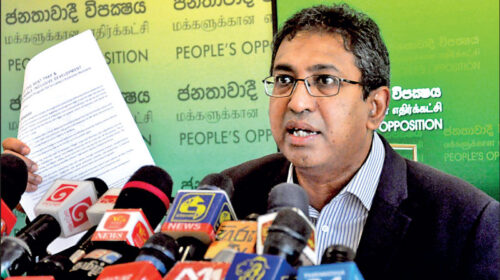 Ina compelling address toParliament, main Opposition Samagi Jana Balawegaya (SJB) MP Dr. Harsha de Silva delivered a comprehensive critique of Budget 2024, shedding light on critical issues that demand urgent attention.
Ina compelling address toParliament, main Opposition Samagi Jana Balawegaya (SJB) MP Dr. Harsha de Silva delivered a comprehensive critique of Budget 2024, shedding light on critical issues that demand urgent attention.
De Silva, who is also the Committee on Public Finance (COPF) Chairman, meticulously outlined the shortcomings and concerns surrounding the economic policies proposed in the budget, providing a stark contrast to the optimistic claims made by the Government.
Dr. de Silva commenced by pointing out a blatant violation of the Fiscal Management Responsibility Act (FMRA) within Budget 2024, citing an alarming budget deficit exceeding 5%.
He substantiated his concerns by referencing reports from LirneAsia, the World Bank, and UNDP, revealing a staggering increase in poverty affecting 3 to 7 million people. The multi-dimensional vulnerabilities highlighted by UNDP underscored the severity of the crisis, with over 50% of those affected categorised as multidimensionally poor.
De Silva expressed gratitude to petitioners who played a pivotal role in the recent Supreme Court verdict on economic crimes. He emphasised that the court›s rigorous discussion identified key figures, including Mahinda Rajapaksa, Gotabaya Rajapaksa, Basil Rajapaksa, Ajith Nivard Cabraal, and Dr. P.B. Jayasundara et al, as responsible for the economic downturn, pushing over 4 million people into poverty. He called for a parliamentary discussion on the civic rights of those found guilty of bankrupting Sri Lanka.
Contrary to the President›s claims of stabilised inflation and economic equilibrium, de Silva cited CBSL former Deputy Governor W.A. Wijewardene›s statistics. The cost of living for a family of four, he revealed, had surged from Rs. 91,880 in January 2021 to Rs. 175,490, illustrating a 91% increase in the last two years.
Labelling the current Government as an «Oxymoron,» SJB MP drew a parallel to Shakespeare›s Romeo & Juliet. In this case, ‘being together is such a sweet sorrow’. He raised questions about the legitimacy of the Government›s economic vision. MP Harsha presented a scientific analysis of the growth targets set by the Government. To achieve advanced economic status by 2048, he highlighted the necessity of a growth rate of 6.4% from 2027 to 2048. He challenged alternative claims, stating that even growing at 3% would delay reaching advanced economy status until 2068.
De Silva dissected Budget 2024, emphasising three critical pillars for Sri Lanka›s recovery: eradicating corruption, creating economic opportunities, and ensuring social equity. The seasoned politician delved into each point, offering a pragmatic assessment and proposing viable alternatives.
Need to combat corruption
He underscored the need for robust measures to combat corruption across various sectors. He criticised the absence of tangible anti-corruption initiatives, citing examples like the cricket scandal, sugar tax scam, and fraudulent activities in the liquor industry. The SJB parliamentarian questioned the Government’s inaction and proposed the implementation of the Stolen Assets Recovery (STAR) program and the establishment of an independent prosecutor’s office, as outlined in the SJB blueprint.
Moving to the second point, de Silva highlighted the importance of creating economic opportunities for youth in rural areas, empowering entrepreneurs, supporting small and medium businesses, and ensuring fair prices for farmers. He argued that eradicating corruption alone is insufficient and advocated for a broader economic vision.
In his exploration of the third key aspect, the SJB MP shed light on the complexities of fiscal consolidation and expenditure reduction, emphasising the profound implications for social equity. Despite the President’s focal point on revenue-based fiscal consolidation, concerns surfaced regarding the comparatively meagre attention given to reducing overall expenditure.
He acknowledged challenges in curtailing expenditure, particularly in vital sectors like Health and Education, allocated a modest 1.7% of GDP. However, he expressed reservations about funding directed to loss-making SOEs, exemplified by SriLankan Airlines, which sought Rs. 110 billion to settle liabilities to Ceylon Petroleum Corporation (CPC) recently. This raises concerns about fairness in comparison to the total expected revenue from PAYE of Rs. 100 billion annually or essential needs like children’s uniforms, a significant 27 times less.
Criticism was directed toward the extension of tax breaks, citing the Strategic Development Projects (SDP) Act and recent Supreme Court rulings on preferential tax treatment for associates, resulting in substantial losses to the Treasury.
He said a historical lens revealed a stark decline in Government revenue from 20-21% of GDP in 1994 to a current low of 8%, framing a narrative of economic transformation. The disparity between IMF revenue targets (15% of GDP by 2026) and the anticipated 10.2% for 2023 was underscored, calling for a substantial 2.5% increase, equivalent to Rs. 1229 billion.
Fairness and transparency for tax changes
However, concerns were articulated regarding proposed tax changes, especially their disproportionate impact on citizens through heightened consumption taxes. For example, the VAT hike from 15 to 18% and the removal of VAT exemptions for items like petrol, diesel, gas, and fertiliser could drive inflation up and consumption down. He called for fairness and transparency advocating for the disclosure of tax changes to Parliament, ensuring public awareness amid talks of Government giveaways.
De Silva proposed the Government implement his revised PAYE tax structure, significantly reducing the burden on professionals while still achieving the expected income. The MP lamented the lack of response from the Ministry of Finance to their proposal, contrasting it with the President’s call for cooperation.
Rallying cry for comprehensive reforms
In a dramatic climax, de Silva concluded that the proposed tax burden is excessively high, risking a decline in consumption, business failures, and an exodus of professionals from Sri Lanka.
His impassioned critique serves as a rallying cry for comprehensive reforms, emphasising the urgency of addressing corruption, fostering economic growth, and ensuring social justice to pave the way for Sri Lanka’s resurgence.
Acknowledging the Government’s efforts to broaden the tax net, de Silva highlighted initiatives such as the requirement for a Tax Identification Number (TIN) to open a bank account, obtain building permits, register vehicles, or renew revenue licence.
These measures, while commendable, de Silva said set the stage for a broader conversation about Sri Lanka’s economic trajectory, moving beyond stability to growth.
He stressed the imperative of transcending mere economic stability and transitioning towards sustainable growth. He referenced the International Monetary Fund’s (IMF) expectation for Sri Lanka to achieve debt sustainability by 2027, emphasising the challenges posed by a projected debt-to-GDP ratio of 104%, significantly exceeding the internationally accepted norm of 60%.
Expressing concern over the staggering debt-to-GDP ratio, de Silva underscored the potential ramifications, particularly the substantial interest payments. With interest payments for 2024 reaching a staggering Rs. 2,651 billion against revenue of Rs. 4,127 billion, he pointed out that Sri Lanka could become the world’s top contributor to interest payments relative to Government revenue.
Raising pertinent questions, the SJB MP inquired about the status of discussions with the Exim Bank of China and the agreement of the Paris Club, questioning the transparency of the process. He delved into the controversial Macro-linked Bond (MLB) proposal, expressing reservations about its potential benefits favouring external investors over the workers in provident funds who bore the majority of the burden during debt restructuring.
He passionately urged authorities not to bind future administrations to what he perceived as an unjust deal with International Sovereign Bond (ISB) holders. Furthermore, he reiterated that a 30% haircut is insufficient for debt sustainability. He questioned the beneficiaries of specific bonds, including the $500 million bond, and sought clarity on the ownership of Hamilton Reserve bonds amounting to $250 million. The recent Supreme Court decision added further complexity, prompting Harsha to call for transparency in navigating the fiscal challenges.
Expressing concerns about the stability of the banking system, de Silva questioned the lack of information on the promised asset quality review by the President. He delved into the Budget’s allocation of Rs. 450 billion for bank recapitalisation in 2025, emphasising the President’s acknowledgment that this amount may be insufficient.
The proposed 20% privatisation of the Bank of Ceylon (BOC) and People’s Bank was commended as a move towards stability and accountability, free from political influence.
De Silva painted a challenging picture for Sri Lanka’s future debt issuance, projecting a debt of $ 68 billion by 2027. He raised critical questions about sourcing the required funds through taxes and the conversion of tax revenue into dollars. Addressing this, he emphasised the necessity of increasing forex reserves and advocated for a growth-oriented production economy.
Need for mindset shift to achieve higher growth rates
In a sharp critique of the current Government’s approach, the SJB MP highlighted the need for a mindset shift to achieve higher growth rates. He underlined the importance of breaking down barriers and reducing red tape to connect with global production networks. Referencing opposition to the Sri Lanka/Singapore Free Trade Agreement (FTA) by certain political entities, he advocated for an open-minded approach to foster economic growth.
Drawing inspiration from former President J.R. Jayewardene’s initiatives in the 1970s, de Silva emphasised the role of investments in building capital, especially in a country with low savings. He urged the creation of an environment conducive to entrepreneurs, promoting foreign direct investments as a means to fuel economic growth.
He proposed creative solutions such as building wind farms in Mannar and connecting Sri Lanka to India’s grid to earn valuable forex by exporting power to South India. He challenged conventional thinking, advocating for an open mindset in generating forex through innovative and collaborative projects.
De Silva ‘s comprehensive address underscores the intricate challenges facing Sri Lanka’s economic landscape and proposes strategic reforms to navigate the country towards equitable growth. His impassioned plea for transparency, accountability, and a visionary approach serves as a rallying cry for a new economic trajectory.
Ex-Tourism Chief recommends preserving historic Nuwara Eliya Post Office
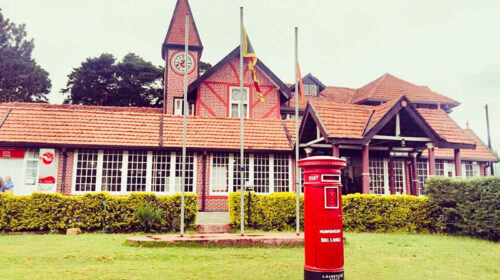 Former Sri Lanka Tourism Chairperson Kimarli Fernando suggested yesterday to consider switching the President’s Nuwara Eliya residence into a hotel as an option if demand arises for additional accommodation.
Former Sri Lanka Tourism Chairperson Kimarli Fernando suggested yesterday to consider switching the President’s Nuwara Eliya residence into a hotel as an option if demand arises for additional accommodation.
She voiced her concerns over the Government’s decision to convert the historic Nuwara Eliya Post Office into a hotel, acknowledging the ‘excess’ room capacity in upcountry city.
“Nuwara Eliya currently has excess room capacity. Should there be a need for more rooms, converting the President’s Nuwara Eliya house, to a hotel, could be considered in the future, if needed,” she said via her Facebook account.
On Monday the Cabinet of Ministers approved a proposal presented by President Ranil Wickremesinghe in his capacity as the Investment Promotion Minister to convert Nuwara Eliya Post Office into a hotel.
“Taj Group has proposed converting the Nuwara Eliya Colonial-era Post Office into a hotel. The proposal came to the Presidential Secretariat and the specifics will be made available by the Secretariat once the project gets off the ground,” Cabinet Co-Spokesman and Minister Bandula Gunawardana confirmed at the post-Cabinet meeting media briefing on Tuesday.
Fernando said the Post Office in Nuwara Eliya, the Tudor-style two-storey red-brick building with a clock spire, was constructed in 1894 by the British. Sri Lanka Post has been in existence for more than 209 years, with a proud history and heritage.
“It should remain as a working Post Office. If management needs to be shared to uplift, where income is shared, a unique memorabilia museum, store or tea boutique could be considered, to generate income,” she noted.
Sri Lanka’s democracy under siege
lurking shadows of business-politics nexus
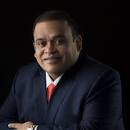
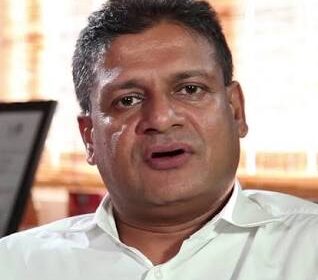 In a startling revelation, Sri Lanka’s businessman Dhammika Perera, who aspires to enter the presidential race, has made a striking statement that should raise alarm bells. According to a recent article by K. Sujeewa in “Anidda” newspaper, published on Sunday, October 29, Perera is willing to pay a significant price for votes, boldly stating, “If SLPP vote base ‘Pohottuwa’ rises to 30%, the remaining 20% will be bought over in cash.” This admission sheds light on a disturbing trend in the country’s politics and the potentially dangerous implications for democracy.
In a startling revelation, Sri Lanka’s businessman Dhammika Perera, who aspires to enter the presidential race, has made a striking statement that should raise alarm bells. According to a recent article by K. Sujeewa in “Anidda” newspaper, published on Sunday, October 29, Perera is willing to pay a significant price for votes, boldly stating, “If SLPP vote base ‘Pohottuwa’ rises to 30%, the remaining 20% will be bought over in cash.” This admission sheds light on a disturbing trend in the country’s politics and the potentially dangerous implications for democracy.
Business Tycoons Eyeing the Presidential Arena
Dhammika Perera is not alone in his quest for political power. Another prominent businessman, Dilith Jayaweera, is reportedly gearing up to join the presidential race. However, their affiliations and motives must be scrutinized. Both Perera and Jayaweera are widely seen as loyalists of the Rajapaksa clan, indicating an ongoing attempt by the Rajapaksas to consolidate their power base through unconventional means.
These business tycoons have amassed significant wealth, particularly since the Rajapaksas’ rise to power in 2005. As confirmed by the Auditor General, out of the 8 trillion project loans Sri Lanka received by 2015, only 2 trillion worth of assets can be accounted for. This alarming gap begs the question: what happened to the remaining 6 trillion, and how might it be connected to business figures? Entry of Perera and Jayaweera
Dhammika Perera found his way into Sri Lanka’s Parliament, albeit through unconventional means, using a legislative loophole. Dhammika Perera and Dilith Jayaweera’s role in previous elections and their financial investments in political campaigns cannot be ignored. The question arises: how much did these businessmen contribute to bringing political leaders like Gotabaya Rajapaksa to power?
Business Interests and Political Favours
The Rajapaksas have shown gratitude to businessmen like Dhammika Perera and Dilith Jayaweera by granting them various favours. For instance, Perera was allowed to run a casino business without impediments, and the recent discussion of a casino tax scandal raises concerns about their influence in government circles. Furthermore, Jayaweera’s pharmaceutical company was granted a lucrative monopoly during the COVID-19 pandemic to import antigen test kits, demonstrating the intertwining of business interests and political decisions.
The Call for Accountability
This collusion between businessmen and politicians raises questions about the integrity of Sri Lankan politics. It is imperative that these individuals are held accountable for their actions and that any ill-gotten assets are returned to the public. The need for transparency and justice is paramount.
The Commoditization of Votes
The blatant statement made by Dhammika Perera that he is willing to “buy 20% of the vote in cash” is not only a violation of the Election Law if an election had been declared but also a grave affront to the democratic process. Such remarks reduce the value of the vote to a mere commodity, casting doubt on the integrity of the election system and the politicians involved.
The Transformation of Sri Lankan Politics
The evolution of Sri Lankan politics is evident when comparing politicians from the post-independence era to those who emerged after the 1970s. The latter have relied heavily on financial backing from businessmen to fund their election campaigns. The consequences are far-reaching, as these politicians prioritize personal gain over the welfare of the nation.
Many individuals with questionable backgrounds and vested interests have found their way into Parliament, including those accused of murder and illicit activities. The intertwining of business interests and political power is a concerning trend that needs to be addressed, as it undermines the principles of democracy.
The Decision for Sri Lankan Voters
Sri Lankan voters now face a critical choice: whether to sell their votes to individuals like Dhammika Perera, who see their ballots as commodities or to reject the influence of corrupt businessmen and politicians who have profited at the expense of the nation.
The author is a former Senior Consultant, Sri Lanka Institute of Development Administration (SLIDA). He can be contacted at Shantha323@gmail.com
https://www.dailymirror.lk/opinion/Sri-Lankas-democracy-under-siege/172-270312